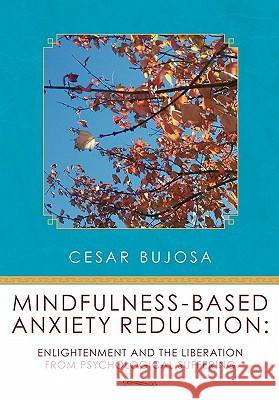Mindfulness-Based Anxiety Reduction: Enlightenment and the Liberation From Psychological Suffering » książka
Mindfulness-Based Anxiety Reduction: Enlightenment and the Liberation From Psychological Suffering
ISBN-13: 9781456319670 / Angielski / Miękka / 2011 / 302 str.
This manual on Mindfulness-Based Anxiety Reduction (MBAR) is written for people who are interested in both the cessation of psychological suffering and enlightenment. MBAR proposes that our sense of personal identity and history are conceptual constructs that orient us to our human lives. Though such conceptions serve us, they also deliver psychological suffering. Psychological suffering is of the nature of ideas and memories. It follows that the liberation from such suffering must provide for the loosening and restructuring of troubling conceptions. Non-conceptual awareness, which is closely allied with enlightenment, presents a perspective that is outside the purview of conceptual suffering. It is immediate, rather than recalled; sensory, rather than pensive; and impersonal, rather than individual. Non-conceptual awareness, as described in MBAR, is at once enlightenment, as well as being the deactivation of the conceptualizing that delivers psychological suffering. There is no neurosis in the moments of non-conceptual awareness, which occurs in deep sleep, as well as in mindfulness meditation. Mindfulness meditation and its equivalents radically reduce the mind's activities of labeling, judging and creating scenarios. It results in what may be described as a psychological distancing in which mental events are not automatically construed as indicators of who you are. Cognitive Behavioral Therapy Innovator Aaron Beck authoritatively defines the term: "The process of regarding thoughts objectively is labeled distancing. . . . A] person who can examine his automatic thoughts as psychological phenomena rather than as identical to reality is exercising the capacity for distancing." There is, suggested in Beck's definition, a remarkable potential for liberation. This liberation is realized in mindfulness meditation and its equivalents. The act of repeated shifting to non-conceptual awareness loosens the hold of the conditioned mind, limiting the compelling spell of thoughts. We can then engage psychotherapeutic insights and skills with much greater effectiveness, because the root of the problem is treated. MBAR has recruited Schema Therapy to conceptualize the varieties of our psychological problems. Schema Therapy suggests that our core emotional wounds were derived from early exposures to circumstances that frustrated an essential human need like sustenance, protection, belonging, or being cherished. These disquieting memories and their related worldviews can readily become lifelong fixations that thwart the development of functional values. The healing strategy is to supplant fear driven coping modes that sustain psychological suffering, with mindfulness and its equivalents. Generally speaking, the significance of quieting the mind in the manner of mindfulness, escapes us, as we fail to notice it is restorative. The distilled awareness is a revolutionary encounter with the very same life we have been living.
Zawartość książki może nie spełniać oczekiwań – reklamacje nie obejmują treści, która mogła nie być redakcyjnie ani merytorycznie opracowana.











